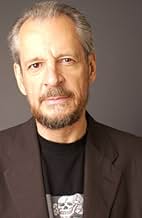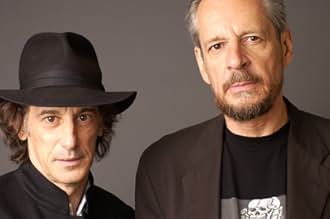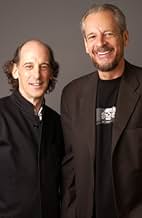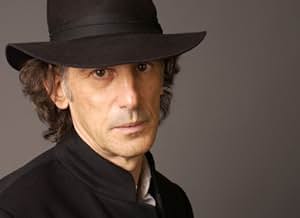कई कैलिफ़ोर्निया स्केटबोर्डर्स का जीवन, जिनका अ्पने माता-पिता के साथ और उनके बिना संबंध कैसा रहा.कई कैलिफ़ोर्निया स्केटबोर्डर्स का जीवन, जिनका अ्पने माता-पिता के साथ और उनके बिना संबंध कैसा रहा.कई कैलिफ़ोर्निया स्केटबोर्डर्स का जीवन, जिनका अ्पने माता-पिता के साथ और उनके बिना संबंध कैसा रहा.
- निर्देशक
- लेखक
- स्टार
- पुरस्कार
- 3 कुल नामांकन
Zara McDowell
- Zoe
- (as Zara Mcdowell)
Wade Williams
- Claude's Father
- (as Wade Andrew Williams)
Julio Oscar Mechoso
- Peaches' Father
- (as Julio Oscar Mochoso)
Ashley Crisp
- Rebekah
- (as Ashley E. Crisp)
फ़ीचर्ड समीक्षाएं
10peedur
Anyone who finds pornography disturbing will find "Ken Park" disturbing for both the wrong and the right reasons.
Its not pornography, but it will be confused with it easily since it contains many of the same powerful ingredients: nudity and explicit sexual behavior. What separates it from pornography is that "Ken Park"'s intent is not to arouse but to provoke an emotional response by placing these same powerful ingredients within a troublesome relational context. Unfortunately that's also the problem with "Ken Park".
An average viewer can't witness explicit sexual behavior and be unaffected by it. We are all sexual (mostly) and (most of us) respond to visual stimuli. "Ken Park" demands that the viewer suspend that response, look beyond any arousal or outrage generated from the explicit sexuality and focus on the relationships in the film (of which sex is merely the expression). This asks of the average cinema viewer much more sexual maturity than most films ever hope to ask.
We may demand more pressure on the envelope as a viewing public, but the cumulative effect of pushing the envelope is still in the realm of speculative sociolology. Also, the extreme youthful appearance some of the characters in the film will cause some companies to avoid distribution risks. Free speech is one thing; defending accusations of spreading pedophilia is quite another, and few companies can afford that kind of publicity.
Personally, I think that the Clark and Lachman have made a great film; its a moral and compassionate statement. The characters feel very real; in their banality there is real pathos. In fact, the bland dialogue and delivery explains why sex holds such a powerful lure for these kids. They have access to rare delight and comfort with sex and, weirdly enough, a sense of peace. It rings true. The tragedy plays out that they are all compromised by clueless or pathological parent figures and the sexuality reflects a history of thwarted attachment. The final scene with the three main characters together struck me as very bittersweet since it plays more as a fantasy than a likely scenario.
Art enjoys such a complex, troubled relationship with the American public. We are such a rapidly changing audience with a huge appetite for challenge, yet we don't necessarily absorb the changes we witness. As an audience, we expect far more cultural sophistication than our capacity for balanced interpretation. "Ken Park" is evidence of that.
Its not pornography, but it will be confused with it easily since it contains many of the same powerful ingredients: nudity and explicit sexual behavior. What separates it from pornography is that "Ken Park"'s intent is not to arouse but to provoke an emotional response by placing these same powerful ingredients within a troublesome relational context. Unfortunately that's also the problem with "Ken Park".
An average viewer can't witness explicit sexual behavior and be unaffected by it. We are all sexual (mostly) and (most of us) respond to visual stimuli. "Ken Park" demands that the viewer suspend that response, look beyond any arousal or outrage generated from the explicit sexuality and focus on the relationships in the film (of which sex is merely the expression). This asks of the average cinema viewer much more sexual maturity than most films ever hope to ask.
We may demand more pressure on the envelope as a viewing public, but the cumulative effect of pushing the envelope is still in the realm of speculative sociolology. Also, the extreme youthful appearance some of the characters in the film will cause some companies to avoid distribution risks. Free speech is one thing; defending accusations of spreading pedophilia is quite another, and few companies can afford that kind of publicity.
Personally, I think that the Clark and Lachman have made a great film; its a moral and compassionate statement. The characters feel very real; in their banality there is real pathos. In fact, the bland dialogue and delivery explains why sex holds such a powerful lure for these kids. They have access to rare delight and comfort with sex and, weirdly enough, a sense of peace. It rings true. The tragedy plays out that they are all compromised by clueless or pathological parent figures and the sexuality reflects a history of thwarted attachment. The final scene with the three main characters together struck me as very bittersweet since it plays more as a fantasy than a likely scenario.
Art enjoys such a complex, troubled relationship with the American public. We are such a rapidly changing audience with a huge appetite for challenge, yet we don't necessarily absorb the changes we witness. As an audience, we expect far more cultural sophistication than our capacity for balanced interpretation. "Ken Park" is evidence of that.
I have no problems with the explicit content in the film, go ahead and show whatever you like, just do it for a reason other than to push the boundries. There's nothing less interesting than watching a movie that is based on the premise of Let's Make People Accept Something New. That's lame. It's cheap. The movie is not interesting in the least. It never goes anywhere. It seems as though Larry Clark's ideas for characters were just him thinking he wanted to push the limits of sex on film, and so that's what the characters are doing. They are in no way representative of a real person as this film tries to convince us. This film would be boundry pushing if it was able to contextualize the behaviour and not just put it on a screen. At the film festival Clark answered a question about the inclusion of the character of Ken Park, who seemed to exist for no real reason other than to begin the film with a suicide. Clark responded by saying that he wanted to deal with teenage suicide in the movie, which is fine, but just showing someone shoot themselves in the head is not dealing with teenage suicide. It just exploits violence. There doesn't seem to be any thought, beyond the voyeuristic tendancies of the film makers, in this movie at all.
The Australian government had this film banned. So, that obviously meant that this obscure film that I had never heard of was worth seeing. Thanks to them and the acclaim of Australian film critics (notably Margaret Pomeranz), I - and I assume many others - sought out this film so we could watch it for ourselves.
Whilst the film is certainly not perfect, and is in many ways superficial in it's treatment of the numerous relationships presented (at 90min, they could have easily added another half hour to expand on these), I am glad that films like this exist, if only because they offer an escape from the increasingly similar plots and content of the majority of modern cinema.
Whilst the film is certainly not perfect, and is in many ways superficial in it's treatment of the numerous relationships presented (at 90min, they could have easily added another half hour to expand on these), I am glad that films like this exist, if only because they offer an escape from the increasingly similar plots and content of the majority of modern cinema.
I didn't enjoy this latest offering by Larry Clark. It was as if he took Todd Solondz' Happiness, removed all wit, all semblance of plot and character development, and threw in a few explicit sex scenes for some shock value.
After watching Bully and Kids, I have come to accept Clark's style of storytelling, however I felt that this movie went nowhere. He's usually good at juggling multiple story lines that end up converging in a natural sense, but I felt that in Ken Park he didn't have a enough time to delve into any single character's storyline deep enough for the audience to become engaged with the characters, which to me is a crucial element in any good drama.
When the 1h10 mark came around, I was more alarmed by the fact that there were only 20 more minutes in which to resolve the story than by the incest and murder taking place on screen.
This failure was akin to Lukas Moodysson's A Hole in My Heart. I hope Larry Clark's work will only get better after this.
After watching Bully and Kids, I have come to accept Clark's style of storytelling, however I felt that this movie went nowhere. He's usually good at juggling multiple story lines that end up converging in a natural sense, but I felt that in Ken Park he didn't have a enough time to delve into any single character's storyline deep enough for the audience to become engaged with the characters, which to me is a crucial element in any good drama.
When the 1h10 mark came around, I was more alarmed by the fact that there were only 20 more minutes in which to resolve the story than by the incest and murder taking place on screen.
This failure was akin to Lukas Moodysson's A Hole in My Heart. I hope Larry Clark's work will only get better after this.
ken park or krap nek as they say is basically four episodes with each episode dealing with an individual's family situation or lack thereof. These episodes are inter-cut within each other.
Though Larry's Clark's movies deal with very explicit, or "realistic" subject matter his presentation is overwrought. Characters are more caricatures than 'real' people. The zealot father, the aging housewife, the weird kid, the father with unrequited love. The scenes with these characters were hard for me to take in. The actions and reactions they take seemed so hackneyed to me. Could it be that Larry Clark is developing a "larry clarkness"? a style? As one who is purported to be a breaker of styles and conventions this movie was shot pretty conventionally with lots of sex. I wasn't too impressed with this effort. Some shots, as Larry Clark says, are there for realistic purposes but I just found it to be sensationalistic and unnecessary.
The cinematography was great that is probably due to the Ed Lachman. The blue and red tinge really added to their respective scenes. Probably use of tungsten for outdoors and daylight inside.
Correct me if I'm wrong but I could swear Larry Clark is moving from realism to symbolism. In one scene he has the family gather together on the front steps. Your good Ole' American suburban family, full of deceit and infidelity but putting up a great face none the less. It seemed like a tableau.
Though Larry's Clark's movies deal with very explicit, or "realistic" subject matter his presentation is overwrought. Characters are more caricatures than 'real' people. The zealot father, the aging housewife, the weird kid, the father with unrequited love. The scenes with these characters were hard for me to take in. The actions and reactions they take seemed so hackneyed to me. Could it be that Larry Clark is developing a "larry clarkness"? a style? As one who is purported to be a breaker of styles and conventions this movie was shot pretty conventionally with lots of sex. I wasn't too impressed with this effort. Some shots, as Larry Clark says, are there for realistic purposes but I just found it to be sensationalistic and unnecessary.
The cinematography was great that is probably due to the Ed Lachman. The blue and red tinge really added to their respective scenes. Probably use of tungsten for outdoors and daylight inside.
Correct me if I'm wrong but I could swear Larry Clark is moving from realism to symbolism. In one scene he has the family gather together on the front steps. Your good Ole' American suburban family, full of deceit and infidelity but putting up a great face none the less. It seemed like a tableau.
क्या आपको पता है
- ट्रिवियाUK distributor Hamish McAlpine dropped the film after Larry Clark punched him in the face at a celebratory dinner.
- भाव
[last lines]
Ken Park's Girlfriend: Aren't you glad your mom didn't abort you?
- क्रेज़ी क्रेडिटThe letter K is shown backwards in the credits, except in the first word of the film's title.
- कनेक्शनFeatured in SexTV: Balkan Erotic Epic/American Machismo/Peek: Larry Clark (2006)
- साउंडट्रैकLamar Vannoy
Written by Pete Steinkopf (as Peter Steinkopf), Bryan Kienlen, Greg Attonito, and Shalender Kichi
Performed by Bouncing Souls
Published by Lando Hour Publishing
Courtesy of Chunksaaw Records
टॉप पसंद
रेटिंग देने के लिए साइन-इन करें और वैयक्तिकृत सुझावों के लिए वॉचलिस्ट करें
विवरण
- रिलीज़ की तारीख़
- कंट्री ऑफ़ ओरिजिन
- आधिकारिक साइट
- भाषा
- इस रूप में भी जाना जाता है
- Perversión
- फ़िल्माने की जगहें
- उत्पादन कंपनियां
- IMDbPro पर और कंपनी क्रेडिट देखें
बॉक्स ऑफ़िस
- दुनिया भर में सकल
- $10,58,905
इस पेज में योगदान दें
किसी बदलाव का सुझाव दें या अनुपलब्ध कॉन्टेंट जोड़ें
































